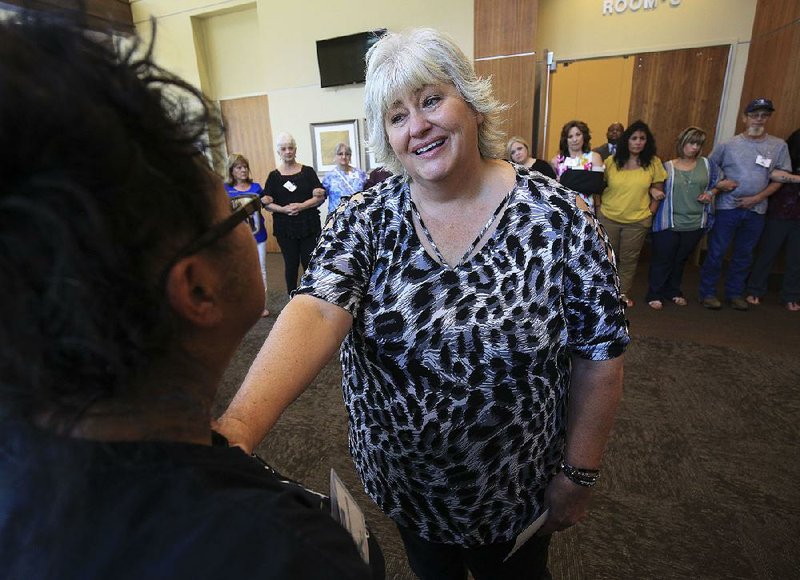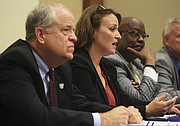On Feb. 28, 2006, Travis Roberson's sisters helped him pick out clothes before he drove to Dickson Street in Fayetteville to celebrate Mardi Gras.
They never saw him again.
In any other setting, the story would have been horrific and foreign. But on Thursday, while still horrific, Sonya Roberson found herself in a crowd who understood her worries, her frustrations and her struggle to find her brother.
They had lost someone, too.
Families of missing people crowded in for Attorney General Leslie Rutledge's eighth annual Never Forgotten discussion, where they asked questions of law enforcement officials and heard updates about legislation that may help them in their searches.
Two pieces of legislation that passed in this year's legislative session will aid families of missing people, Assistant Attorney General Bradford Nye told the nearly two dozen families gathered at the Benton Event Center.
Arkansas Act 913 is intended to increase cooperation among state agencies in the instances of missing children, facilitating the transfer of information among state and local agencies. The act will enforce the use of a state child abduction response team -- a conglomeration of agents of law enforcement agencies with the express purpose of finding missing children.
"We are the first state in the nation with child-abduction response teams statewide," Nye said. "We are leading the change."
Arkansas Act 920 will remove any waiting period before adults can be reported as missing or their information entered into national missing persons registries. When Nye explained the legislation's purpose, several people in the room sighed or murmured their approval.
Many had been told that they could not report missing adults for three days, delaying the investigative process.
Act 920 also will require police training in missing persons investigations.
"When you talk to law enforcement officers, they really weren't educated enough in the laws around missing persons," said Kermit Channell, director of the state Crime Laboratory. "That's the greatest thing about this law. It mandates that training, and the officers want to learn."
In fact, Morgan Nick Foundation Executive Director Colleen Nick said, the officers' first training course was happening next door.
Next to the long room where families sat, more than 150 law enforcement officers and leaders listened to Kevin Metcalf of the Washington County prosecuting attorney's office. Metcalf founded the National Child Protection Task Force, which searches for missing children for law enforcement agencies across the United States and internationally using cellphone, social media and other digital investigative methods.
Later in the day, officers heard a presentation on changes in local laws concerning investigations on missing people and unidentified remains.
Each of the 12,000 law enforcement agents in Arkansas is required to have the training within one year, said Jami Cook, secretary of the Department of Public Safety.
Becky Glenn, whose brother disappeared more than 18 years ago, offered a suggestion to the panel of law enforcement leaders Thursday.
"Do you ever have families of missing people come to the training?" Glenn asked. "Our emotions are not like someone in a car wreck."
Glenn said many families react differently. Some lash out in anger when it feels there is no progress being made in an investigation, while others are inconsolable.
"I can't tell you that we've done that in the past but -- what's today, the 18th?" said Little Rock Police Chief Keith Humphrey, stopping in midsentence. "I can tell you that as of July 18, 2019, the Little Rock Police Department will make plans to do that. That's a promise."
People in the crowd answered one another's questions as often as the panel did. Many of them had shared the same frustrations and some were further along in their searches than others. One man said he'd been searching for his loved one for 25 years. Another woman said she had finally found the body of her sister, who had been murdered.
Sometimes, as the families spoke to and over one another, their voices grew tense with anger and exasperation. They spoke of mishandled DNA samples, detectives who seemed reluctant to investigate and evidence that was never gathered.
"Some of us are angry and have been for years," Glenn said. "We have made great strides, I'll give you that. But a lot of us are just left hanging."
Arkansas State Police Col. Bill Bryant suggested that members of one family tell their local police that the state force was willing to assist in any way if the department requested it. Mike Nance, regional system administrator for NamUs, had technicians available to take DNA samples from family members who did not have a familial DNA on file with the online database of missing persons and unidentified remains.
NamUs' promotional material says 600,000 people disappear and around 4,400 unidentified bodies are found every year in the United States. Many of the missing return home safe; many do not.
"I've done the knock where you tell someone their loved on died in some horrific incident," Nance said. "You haven't gotten that knock, and you live in this ambiguous loss. I understand that."
Nick is the executive director of the Morgan Nick Foundation, named for her 6-year-old daughter who was abducted from a softball field in 1995. Throughout the meeting, she served as a mediator for the families, often stepping in to ask questions or to explain.
Nick gathered the families in the hallway outside the room before the panel and asked them to lock arms. Standing in the center of the circle, she walked from person to person, recalling moments from their search.
"Remember when we made Cassie's poster?" she asked one woman, pushing her gently. "I never thought we'd have to go through a funeral."
Before moving on to the next person, Nick asked the same questions: Are you still standing? Are your friends holding you up?
"It's really easy to get frustrated, but we need to look at what we've accomplished," Nick said, her voice softening. "We're getting there."
Metro on 07/19/2019

